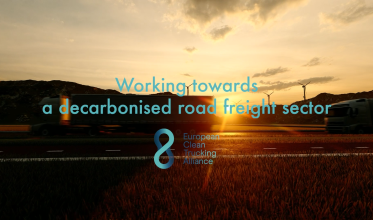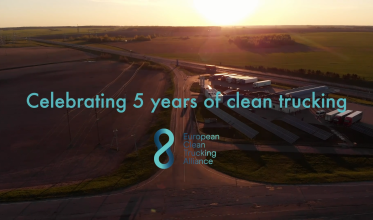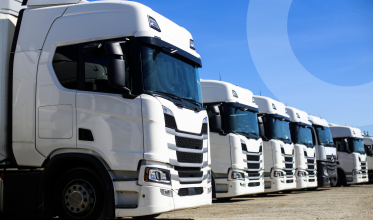In March this year, the European Commission published the European Climate Law on how to make Europe’s economy and society climate-neutral by 2050. Later in 2020, a proposal will follow to increase the 2030 climate targets to at least 50% and towards 55% in a responsible way.
Decarbonising the road freight sector is crucial for Europe to meet both these targets. While fuel efficiency measures and logistics efficiency are an ongoing process that reduces the climate impact of road freight, Europe needs to accelerate the full decarbonisation of the road freight sector based on a strategy taking into account total cost, scalability and sustainability of available carbon-neutral technologies coming from renewables. Not only the road freight sector, but all transport-related sectors including the energy supply sector, gas stations and service providers need a strategic roadmap with a binding framework to introduce green and zero-emission technologies.
At the same time, the long-term objective should be the shift to zero-emission trucks1 to meet the 2030 and 2050 climate targets. Zero-emission vehicles will improve air quality, and therefore not only benefit our climate but also our society as a whole. The European Clean Trucking Alliance (ECTA) brings together shippers, the logistics sector and civil society with the goal to achieve the fastest feasible decarbonisation of road freight. The Alliance believes that the upcoming work programme of the European Commission offers many significant opportunities to support the sector in this transformation to zero-emission trucks, and the members of this Alliance are fully committed to make this a successful transition.
But in order to make this happen, the European Commission should come forward with a clear pathway and political strategy to enable the rapid deployment of zero-emission vehicles and infrastructure. Necessary COVID-19 recovery investments need to safeguard jobs and support long-term sustainable solutions that will decarbonise the road freight sector. New public investments should not go to bridging technologies, such as fossil fuels.
With this Communication, the European Clean Trucking Alliance is calling upon the European Commission to:
- Introduce as part of the Strategy on Sustainable and Smart Mobility a clear roadmap with intermediate targets on how to decarbonise the road freight sector and trucks by 2050. This means phasing out further support measures for fossil fuels at European and national level. Analyse as part of this strategy the total costs and scalability of different technologies for zero-emission trucks, including long haul road freight and set a clear roadmap for a complete infrastructure roll-out by 2040 favouring the most cost- and resource-efficient pathways.
- Use the Revision of the Alternative Fuels Infrastructure Directive (AFID) to accelerate the deployment of zero-emission truck infrastructure – which is currently lacking – and ensure a coordinated rollout to avoid any bottlenecks for cross-border road freight.
We, therefore, call on you to:- Analyse in the upcoming impact assessment whereby when and how much infrastructure is needed.2
- Change the Directive into a Regulation to ensure a proper implementation. Introduce for urban and sub-urban areas binding Member State targets for future-proof
charging infrastructure for battery electric trucks as of 2025. In this regard widen the scope of the Regulation beyond public charging and set binding targets for shared charging infrastructure such as logistics hubs. - Introduce for long-haul transport binding Member State targets as of 2025 for zero-emission infrastructure only, meaning recharging points, electric road systems3 and green hydrogen.
- Introduce a dedicated EU funding scheme with grants to support the road freight sector installing charging infrastructure in depots, purchasing zero-emission vehicles and supporting other carbon-neutral technologies, coming from renewables.
- Conclude the Eurovignette Directive revision without any delay, mandating significant toll reductions for zero-emission trucks.
- Come forward with a proposal for CO2 performance standards for all types of trucks and trailers by 2022 at the very latest. In this proposal, the ambition of the targets needs to be in line with the revised 2030 climate targets and ambitions of the Green Deal, while strongly accelerating the supply of zero-emission trucks that is currently clearly lacking. Moreover, increase the ambition in the proposal for more stringent air pollutant emissions standards for combustion-engine vehicles, to further reduce air pollutants of diesel and gas trucks under all driving conditions.
- Ensure in the upcoming EU batteries Regulation that batteries are produced in a sustainable way and raw materials are ethically sourced and recycled at the end of battery lives. This means introducing a mechanism to measure and reduce the environmental footprint of battery cell manufacturing, its entire lifecycle impact and ensure that batteries are easy to disassemble, to repair, to reuse and to recycle.
Notes
1 Zero-emission vehicles need to demonstrate zero-emissions at the tailpipe and be powered by renewable electricity (as grids in the EU decarbonise), or hydrogen, produced from renewables and respecting adequate sustainability safeguards.
2 This should include an assessment of how existing grid capacity can be used most efficiently for HDV electrification and where upgrades are needed.
3 Trucks are charged dynamically while moving, with a catenary system, a rail or by induction.





